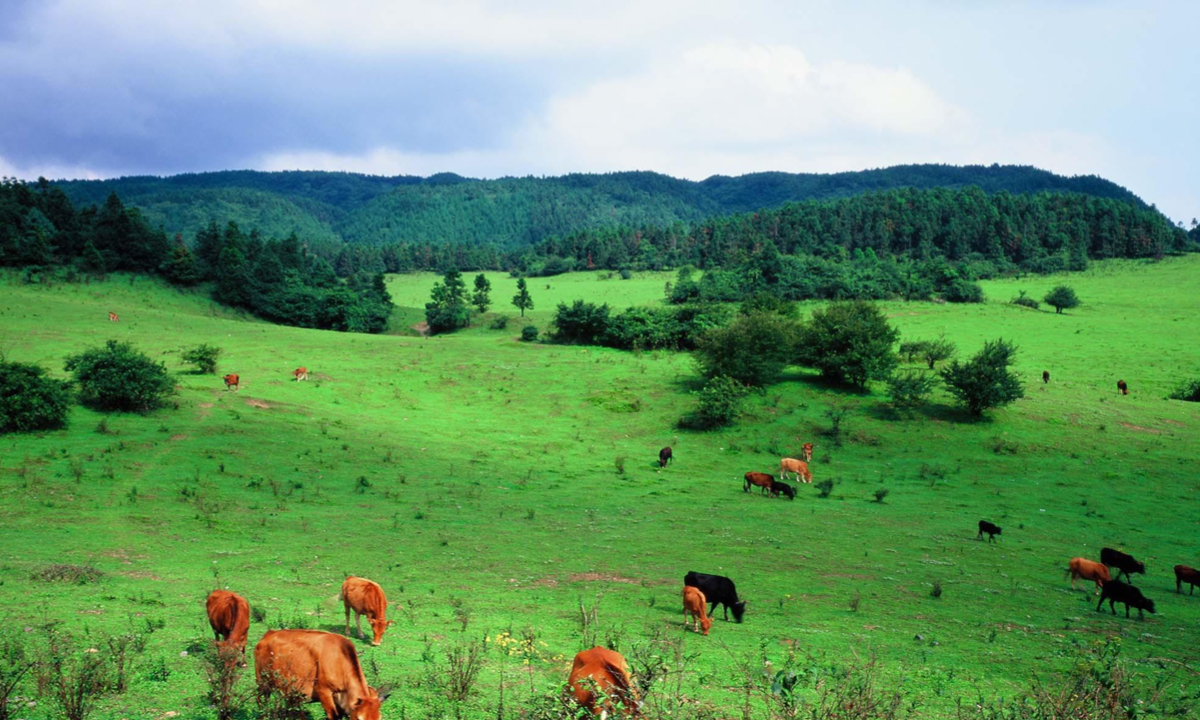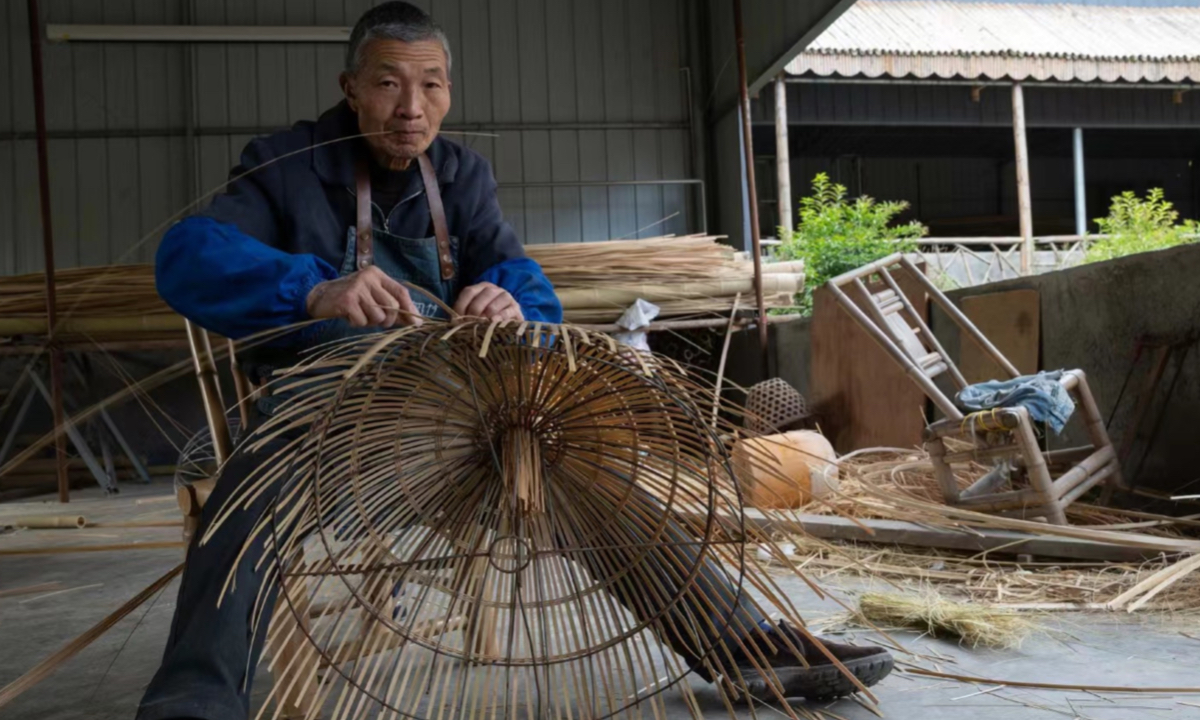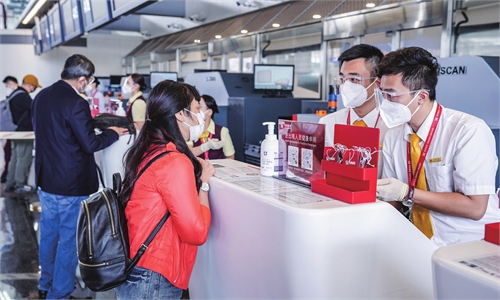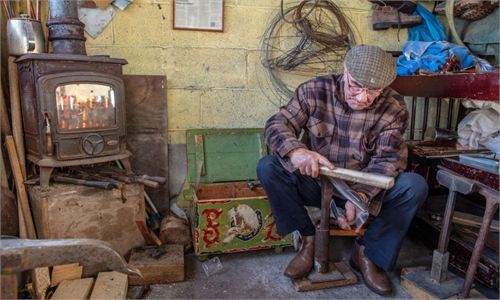ARTS / ART
Jingzhu earns Best Tourism Villages title through creativity, heritage and sustainability
Innovating tradition

The mountainous view at the Jingzhu village Photo: Courtesy of Jingzhu village

A local villager makes a bamboo product. Photo: Courtesy of Jingzhu village
Editor's Note:Two Chinese villages, alongside 30 other villages from around the world, have been named as Best Tourism Villages 2022 by the World Tourism Organization (UNWTO). Based on a set of criteria covering nine areas, the new Best Tourism Villages 2022, including Dazhai in South China's Guangxi Zhuang Autonomous Region and Jingzhu in Chongqing Municipality, were chosen for their ability to preserve and promote rural and community-based values, products and lifestyle and their clear commitment to innovation and sustainability in the economic, social and environmental aspects.
In the final article of this series, the Global Times will take readers on a tour of Jingzhu village to better understand its charm, innovative efforts and local culture.
Jingzhu, a village located on Fairy Mountain in Wulong, Chongqing Municipality, has managed to preserve most of its natural scenery and culture. Its distinctive four seasons, forests, grasslands, canyons and cliffs are appreciated by many tourists, who see the village as the perfect place to vacation, especially in July, August and September.
Jingzhu has become a model village full of vitality by adopting new ideas and modern designs. On one hand, the village has retained the lifestyle and architectural features rooted in its unique geography and culture; on the other hand, it has introduced modern creativity to revamp public spaces, using local tiles, wood and rammed earth walls to promote its traditional culture.
Staying original
"We were so excited when we heard the news because my colleagues had been staying up late in order to prepare the application. It was quite a unique experience," Chen Ju, the village's Party chief, told the Global Times on Thursday.
To preserve its original appearance and traditions, the village set aside a special area, named Guiyuan, or "Return to Origin," as a public space where traditions such as bamboo weaving, paper cutting and local food production techniques can be shared.
In Chen's opinion, the village's most representative tradition is bamboo weaving, as it makes use of the most commonly found material around the village.
"We build a society out of what we are given. We were once very familiar with every use of bamboo, which we made into farming tools and even buildings. However, as the village developed, bamboo was forgotten," Chen noted.
"So we must find a way to preserve our historical inheritance that has lasted for hundreds of years. This is also one of the basic standards for our tourism development."
Through the Guiyuan workshop, villagers have also established shared cultural spaces for themselves and tourists by constructing a library, exhibition hall and a culture and art base.
Young people can get quality education through intangible cultural heritage exhibitions, performances, and workshops. Each summer, teenagers from other countries also come to the village for international summer camps, during which they learn how to farm through practical experience.
Green development
One reason that Jingzhu stood out is due to its innovation and sustainability in all its aspects - economic, social and environmental - and focuses on developing tourism in line with the UN's Sustainable Development Goals.
The accolade recognizes rural destinations that are embracing tourism as a driver of development and new opportunities for jobs and income, while preserving and promoting community-based values and products, according to UNWTO.
The tourism development of Jingzhu has created 312 jobs and the proportion of local villagers taking part in the industry exceeds 50 percent, according to China's Ministry of Culture and Tourism.
Jingzhu follows the concept of green development and actively advocates carbon neutrality. In April each year, local government institutions carry out activities aimed at reducing water consumption and waste, as well as organizing lectures on climate change prevention and reduction of disposable plastic products to strengthen local awareness of environmental protection.
They also encourage the use of organic fertilizers and planting green crops to reduce pollution and furthering green agriculture. To increase plant diversity, local villagers have set up artificial bird nests and feeding points in forests to attract birds and improve their habitat.
"Rural areas are one of China's most important components. To ensure the development and stability of rural areas, we need to pay attention to many aspects like food security and economic progress. Different places should develop their economies based on local conditions," Lü Dewen, a research fellow for rural administration studies at Wuhan University, told the Global Times. "There was no doubt that Jingzhu village should develop a unique tourism industry that relies on its natural scenery. It guarantees income and at the same time preserves the natural scenery. It is a model worth learning from."



